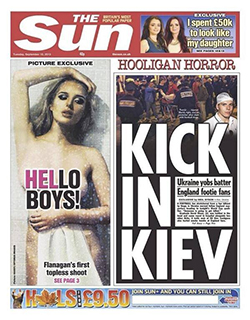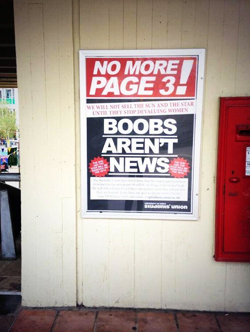I walk into an off-licence (a shop that sells alcoholic drink for consumption elsewhere) in Italy. I’m with a couple of people, girls. One of the men behind the counter in the claustrophobic shop appraises us, unsmiling. He points at one of my friends. “She’s the prettiest of you three,” he says. Still in Italy, I turn on the TV as I’m eating lunch and I see a naked woman humping a cannon ball while imitating fellatio. I wait for the next music video before changing channel – the male artist is sitting fully clothed in a car, on his phone, only giving the camera half his attention.
My father works in a school in England. A leaving ceremony is held for the oldest pupils, when every boy and girl receives a gift from the school. It is an emotional day, a memory which will stay with pupils for years. The organisers intend to convey final messages of life advice to these young people. The boys are given ties. The girls are given mirrors.
The best-selling British newspaper The Sun prints a large photo of a young and voluptuous woman in nothing but her knickers every weekday, on Page 3. It has been doing so since 1970.
Did the man in the off-licence think he had the right to judge our attractiveness because in ice-cream bars and sitting rooms he had seen so many hyper-sexualised female singers, attracting his attention not through their music but their tongues? Did the female model between news items in the paper encourage teachers to differentiate between the sexes in their choice of presents, literally preparing boys for the politics of page 1 and girls for the “glamour modelling” on Page 3? Or does free-will reign over conditioning when it comes to equal rights?
No more page 3

The question is at the heart of the debate currently raging in Britain about the bare boobs in The Sun newspaper. The editor Dominic Mohan sustains that Page 3, as the feature is known, is an “innocuous British institution”. The founder of the No More Page 3 campaign, meanwhile, whose online petition has been signed by over 130,000 supporters, claims that Page 3 contributes to a misogynist environment in which eating disorders, domestic violence and sexual abuse are more likely to come about.
The arguments surrounding Page 3 apply to the media in a much wider sense. Media hyper-sexualisation has been increasing since the sixties and research suggests that this applies far more to women than to men. A study of Rolling Stone covers showed that in the 2000’s, 2% of the front covers depicting a man were hyper-sexualised, in comparison to 61% of those showing women. Europe is no exception. Swathes of advertising is based on female imagery in which eroticism is at the very least implied. Close equivalents to Page 3 can be found in Poland, Austria, Denmark, Bulgaria, Croatia, Finland, Romania, Italy and Germany, and the online versions of the relevant newspapers are often yet more explicit. On the online version of Panorama, an Italian news magazine, there are myriad erotic photos of women, many naked, and on the day of writing, visitors to the website of the Polish tabloid Fakt will be treated to the “Magnificent Bum Gallery” (only female bums allowed).
I have signed the petition against Page 3. I have concluded that there is no excuse for it, nor the equivalents. We are constantly conditioned by the media, and it is currently conditioning us to be sexist.
Sexism in european media
I interviewed several young Europeans on the subject of sexism and the media, because an international problem calls for an international exchange of ideas. The rest of Europe has much to learn from Sweden, for example, which maintains an equality ombudsman to monitor advertising. Perhaps other European countries could take the lead from Britain on No More Page 3.
A former editor of The Sun argued that models “appear in The Sun out of choice and because they enjoy the job”. Some models have publicly confirmed this. But this argument ignores the fact that others are exposed to Page 3, and that their welfare is therefore also relevant to the debate. Between January and June 2013, the overall daily readership of The Sun was around 6,900,000. Politicians have said “if you don’t like it, don’t buy it”. But even those who don’t buy it can’t always avoid it, as it is left around households and public places. Lena, a German economics student and experienced Model United Nations participant, mentioned that the same applies to the German tabloid “Bild”, which contains an equivalent photo and has the highest circulation of any newspaper outside Japan.
In any case the well-being of models is questionable. The No More Page 3 team direct us to statements by a number of glamour models who denounce their work, citing the lack of job security, the low pay, the disrespect from employers and the damage caused to career prospects in other fields. Many explain their choice of job as the result of low self-esteem about their own appearance, and some name Page 3 specifically as a formative influence in this respect. The latter suggests that the choice to become a model is not isolated from external influences, of which Page 3 may itself be one. What’s more, it indicates that images of idealised female bodies can contribute to a negative body image.

On this front, the editor of The Sun has defended Page 3 as a “celebration of natural beauty”. But the natural beauty celebrated is only that of young, white, thin and large-breasted models. Most women and girls don’t look like that, and unsurprisingly begin to feel that they lack this lauded “natural beauty”. They may become under-confident, feel that they need plastic surgery, become anorexic. James, a British student, counsellor and comedian, said “The danger with sexualisation at the moment is that it only includes very particular body types…I think always if you’re very limiting in what you present as sexual you’ll produce people with very limited views. Who’s it damaging to? Young girls in their formative years who will – and I’m not saying they’re stupid – but they will end up with the view that that’s how to be beautiful.” James also commented that the limited sexualisation in the media shapes young men’s attitudes of what is attractive. “That’s going to have a knock on effect on the young women.”
Images of a much wider range of women would be preferable. I myself experience low self-esteem about my body shape, and feel relieved in Italy and France viewing female nudes from the Renaissance and Impressionist eras and seeing a body shape much closer to my own. But as James said “You still have to question whether a newspaper is the best for it – and by and large it’s not that newsworthy if a woman has breasts. That’s fairly unremarkable.”
A problem of miseducation
The question of context is crucial. The No More Page 3 campaign is not anti-nudity or anti-sex. As James pointed out, “attempting to shield the public’s eyes from sexuality can be equally unhealthy”. He drew attention to the skewed logic of the British film rating system, which rates violent films suitable for 12 or 15 year olds, but censors naked women as adult content. Children need to learn about sex. But they shouldn’t learn about it from images like Page 3, or Fakt’s “magnificent bum gallery”. They need to learn – and adults need to be reminded – that women are not sexually available to everyone in every context, and that it’s not polite to behave as if they are. The sexualisation of the media undermines that. As a former model said “Page 3 had the official stamp of society’s approval on it that made it irrefutable.” The context of a newspaper is public: people look at in on trains, in canteens, in front of their children. It is at the very front of the newspaper. It is set amidst discussion of finance, politics, sport, science. All this is implying that enjoyment of the female body can be anywhere, any time, it can involve girls who you don’t know and who may be much, much younger than you.
The exposure of the female body in the media ignores the female perspective.
What does this remind me of? Yesterday, when three times in one day here in Italy, the same man of at least 45 years old shouted “Oy bionda ciao bella” at me as I walked past. The stranger from Kosovo who pretended we knew each other and thought my boyfriend was only relevant if he was in the country. The old man in Vicenza who stopped in front of me and stared, until he said “You’re gorgeous”, then didn’t walk away. The man in Florence who did the same thing. The stranger on the street in Siena today who took a photo of me without permission then walked away laughing. The schoolboys in England who shouted “nice arse” in my direction. This treatment makes me feel uncomfortable. Sometimes I feel ridiculed for trying to look nice. Sometimes I actually feel unsafe. I worry that I will be followed, or that the man or boys will be angry with me for ignoring them.
The exposure of the female body in the media ignores the female perspective. Children need to learn that girls can and should experience sexual enjoyment. The women in newspapers, music videos and adverts are always posing for others or explicitly pleasuring others. Expressions of apparent enjoyment on their part are limited to those which show them to be “beautiful”. Women are not shown being stimulated by others. A former glamour model said that as a teenager surrounded by Page 3 she learned that her “job was to please sexually, that’s what sex meant.”

An intensely hypocritical attitude is embedded in society whereby a woman is considered vulgar if she breast-feeds in public, yet empowered if she reveals her breasts for viewers of her music videos or readers of the newspaper. The latter (only) is seen as a woman “doing what she wants with her body”. Do we actually think about what that phrase means? I asked Maricruz, an Ecuadorian immigrant in Spain who is now studying law on Erasmus in Italy, if she thinks women are empowered by glamour modelling. “TV, music videos and adverts often misuse sexual images of women,” she said. “They imply sexy and strong and free are the same thing. And now girls think that must be true.” In my opinion she summed it up. Our conception of empowerment is itself partially shaped by the media’s presentation of women. Media moguls then justify the presentation by saying the models believe themselves empowered.
Ask me what I want to do with my body, and one thing I’d say is that I don’t want to shave my armpits or legs. It’s a fuss and it’s based on an arbitrary conception of female attractiveness created by people who want to make money selling hair removal products. But I am pressured to shave by adverts and by the total absence of female armpit or leg hair on the screen. In advertising for Gillette Venus, a pink razor for women, this pressure is disguised as an exhortation to take charge, an invitation to Mount Olympus. Its slogan is “Reveal the Goddess in You”.
Lena mentioned that in Germany debate is currently more focused on the lack of female CEO’s than the topless girls in Bild. The former is caused by many societal factors that need to be addressed, but one of those is surely the media. The founder of the No More Page 3 campaign stated that the Page 3 girl was the largest female image in the newspaper even in the issue when a British female athlete’s Olympic gold medal was reported. This is a condemnation of the newspaper as a whole, not only the third page. In fact, the absence of a range of female role models is the norm in mainstream media. As one example, Svennson, a Swedish economics student who has spent both his childhood and an Erasmus semester in Italy, and I have noticed the predominance on Italian TV of men in suits talking to “younger, thin, good looking women who must have big problems handling the weight of normal clothes”. The man is generally being interviewed on his specialism by a woman who is playing the role of the “beginner”. 87% of Europeans watch TV every day and 71% read the press at least once a week. Girls would have a greater range of ambitions if they were reminded constantly that they could be president, film director, physicist. Boys would be more likely to respect female expertise if they were shown women’s capabilities.
Lena made the important point that misrepresentation is not only a problem for women – stereotyping of both genders in the media has reached absurd levels. Men are fed razor adverts depicting half-naked men of Herculean strength engaged in boxing matches. Gay, non-white, disabled and old people are ignored or caricatured. Women’s rights are a subdivision of human rights.
A better future for women in the media?
People are quick to criticise No More Page 3 as an attack on freedom of the press. James can’t abide this: “A lot of people have said it is a call to ban Page 3, which it isn’t. They say it’s censorship and against our free speech, but it’s actually a petition – there’s no question of it being forcibly banned, so it’s a bit of a non-argument.”
Has the campaign been successful? The editor of The Sun in Ireland has changed Page 3 so that the models are wearing swimming costumes. Numerous organisations have announced their support, including trade unions, universities, youth groups and companies. Editors of The Sun have been ambiguous in their reaction. But last month The Sun’s current editor said “It is not set in stone that there must be a pair of breasts every day on Page 3.”
Despite conditioning, the individual retains some control. Lena said that our life-choices and self-esteem are influenced by the media only to the extent that we adapt to the expectations of others. I would say that we are not always ourselves aware that we are adapting to the expectations of others, but we can make an effort to become more aware. We can open our eyes to the sexism in the media and ask ourselves consciously when we make choices if pressure from the media is swaying us. I asked Svennson what individuals could do to achieve change. “Talk about it,” he said. “Try to think about it. Try to think “what would Berlusconi have done” and do the opposite.”
Cover photo: No More Page 3 (Source)







